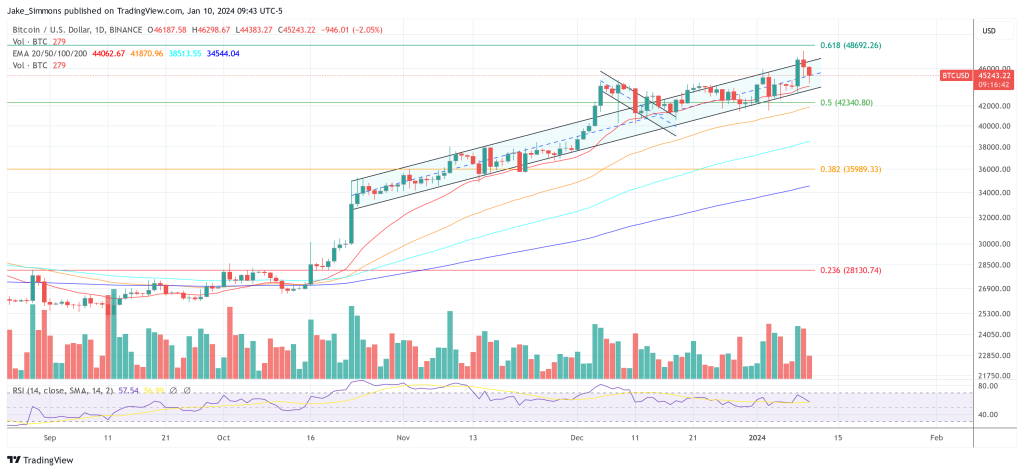ARTICLE AD BOX
Approximately asset management companies are preparing to launch spot Bitcoin and crypto Exchange-Traded Funds (ETFs) in Hong Kong. This information was revealed by Livio Weng, the Chief Operating Officer (COO) of HashKey Group, in an exclusive interview with Chinese local media outlet Caixin.
Spot Bitcoin And Crypto ETFs Set To Launch In Hong Kong
Weng disclosed that out of these companies, seven to eight are in the “advanced stages” of launching these spot crypto ETFs. While it was not specified what this means, it seems clear that not only BTC but also altcoins could be offered as spot ETFs in Hong Kong.
This move positions Hong Kong as a frontrunner in the Asian market, marking it as the first to allow the listing of virtual asset spot ETFs. The Securities and Futures Commission (SFC) and the Hong Kong Monetary Authority (HKMA) have played a pivotal role in this development.
In December 2023, they issued a circular, expressing their readiness to entertain applications for the authorization of virtual asset spot ETFs. This approach indicates a significant shift from the SFC’s initial “professional-investors only” regulatory stance adopted in 2018 for the crypto market.
Julia Leung, the CEO of the SFC, highlighted the regulatory body’s progress towards enabling retail investors to purchase spot Bitcoin and crypto ETFs. Leung emphasized the regulator’s openness to innovative technologies that enhance efficiency and customer experience, with appropriate risk management measures in place.
The SFC’s willingness to accept applications for the authorization of funds with exposure to virtual assets, including spot BTC and crypto ETFs, marks a notable evolution in the regulatory landscape. Notably, Hong Kong has already allowed futures crypto ETFs, such as the Samsung Bitcoin Futures Active ETF, CSOP Bitcoin Futures ETF, and CSOP Ether Futures ETF, available through UBS’ local branch.
Hong Kong Set To Allow “In-Kind” As Well
On a related note, Bitcoinist reported at the end of last year that Hong Kong’s financial regulator set guidelines for approving spot ETFs, embracing both “in-kind” and “cash creates” models. This approach diverges significantly from the US cash-based strategy.
The in-kind ETF approach essentially permits investors to swap their existing assets for shares in the ETF, and similarly, they can convert their ETF shares back into Bitcoin. This bidirectional process enables investors to move between BTC and ETF shares seamlessly.
This approach is particularly attractive to those already holding Bitcoin who wish to broaden their investment portfolios without converting to traditional currencies. On the other hand, the cash ETF model operates through the purchase and sale of ETF shares using conventional currencies, such as the Hong Kong Dollar or the US Dollar.
Gabor Gurbacs, founder of PointsVille and advisor to Tether and VanEck, commented on the developments, noting the increasing competition in the Bitcoin ETF market between Eastern and Western nations. He remarked:
As I said many times, the East-West Bitcoin ETF competition is heating up. Hong Kong wouldn’t launch Bitcoin ETFs without China’s approval. China is determined to put up competition on institutional Bitcoin capabilities. Full nation state adoption game theory in effect.
This development from Hong Kong could potentially further strengthen the demand for BTC and crypto, attracting more institutional and retail investors.
At press time, BTC traded at $45,243.

.png)
 1 year ago
4
1 year ago
4








 English (US)
English (US)